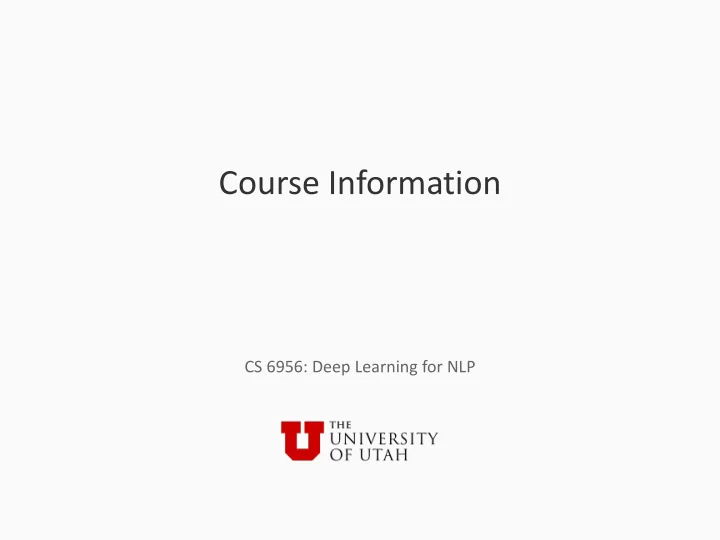

Course Information CS 6956: Deep Learning for NLP
What we will see • A general overview of underlying concepts that pervade deep learning for NLP tasks • A collection of successful design ideas to handle sparse, compositional varying sized inputs and outputs 2
Class focus We will see several example NLP tasks • – Language modeling – Sequence prediction for semantic role labeling – Natural language inference and reading comprehension – Machine translation – And most importantly, Your favorite domain/problem… To understand underlying concepts • – Defining models, training, prediction – Choosing the right architecture for a problem – Tricks and tips Also, applications • – TensorFlow or PyTorch for programming homeworks 3
Course objectives At the end of the course, you should be able to: 1. Define deep neural networks for new NLP problems, 2. Implement and train such models using off-the-shelf libraries, and 3. Be able to critically read, evaluate and perhaps replicate current literature in the field. 4
Course mechanics Course website: https://svivek.com/teaching/deep-learning-nlp Course structure • – Lectures by me initially and gradually, presentations by you No official text book • – Many lectures will follow Yoav Goldberg’s textbook – Useful background reading on course website Pre-requisites: Machine Learning and NLP • Assignments (due dates on schedule page of website) • 1. 3-4 assignments (not hand written, please!) 2. One class presentation 3. One class project in groups of size at most two 4. No midterm/final. Instead, project proposal, intermediate checkpoints, final report and presentation Questions? 5
Assignments Three kinds of assignments: • Coding assignments: – We will use Google’s Colaboratory – You will submit Jupyter notebooks for your assignments • Theory: – Will be somewhat on the simpler side • Paper review: You will pick a paper from a list and write a review for it 6
What assistance is available for you? Course website: https://svivek.com/teaching/structured-prediction We will use Canvas for: Course website for: 1. Announcements and 1. Lecture slides communication 2. Notes and readings 2. Discussion board 3. All submissions Staff Email: svivek at cs.utah.edu Office hours: Wed 2:00 PM, 3126 MEB, or by appointment Please prefix subjects of all emails with course number 7
Policies (see website for details) • This class operates under the School of Computing policies and guidelines. • Collaboration vs. Cheating – Collaboration is strongly encouraged, cheating will not be tolerated – The School of Computing policy on academic misconduct – Acknowledge sources and discussions in all deliverables • Late policy – 10 % penalty if submitted one day late, no further extensions • Access and assistance – If you need any assistance, please contact me as soon as possible Questions? 8
Course expectations This is an advanced course aimed at helping you navigate recent research. I expect you to • Participate in the class • Complete the readings for the lectures • And most importantly, demonstrate independence and mathematical rigor in your work 9
• No readings for next lecture • For questions about registration, please meet me now 10
Recommend
More recommend